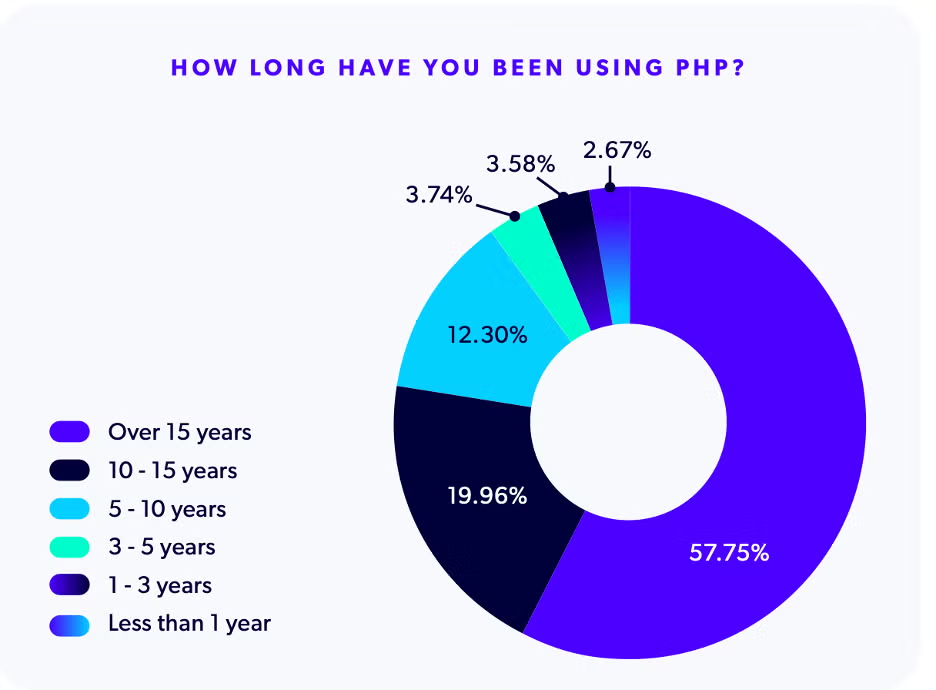Blog
May 1, 2025
Figuring out the best way to begin or advance your career in PHP can be difficult, with the PHP ecosystem constantly growing and new tools, frameworks, and best practices emerging at a fast pace. In order to stay ahead and differentiate yourself from your competition, you must continuously work to sharpen your skills while showcasing your knowledge, expertise, and PHP experience.
In this blog, I give an overview of the current state of developer careers in the PHP landscape. I then outline a few approaches for advancing your career in PHP and showcasing your PHP experience – including the newly relaunched Zend PHP Certified Engineer Exam.
2025 Careers in PHP by the Numbers
PHP is currently in its thirtieth year, and the language remains a strong presence in modern web development. Often referred to as the “glue language of the web,” PHP’s rich ecosystem provides connectivity to most database technologies, and the expansive set of web request tooling allows PHP to pull and push data anywhere. With its powerful capabilities, it’s no surprise that PHP powers an estimated 75% of web applications worldwide.
Despite the language's ubiquitous usage, the 2025 PHP Landscape Report found that approximately 90% of survey participants have been using PHP for 5 years or more, with over half of total participants having used PHP for 15 years or longer.

This PHP experience gap, particularly when paired with rising concerns around hiring from Managers and C-Suite roles, reveals a growing challenge for PHP teams: finding and retaining new PHP talent. However, while this may be a problem for PHP professionals tasked with building a team, it represents an excellent opportunity for developers considering growing a career in PHP.
4 Ways to Advance Your Career in PHP Development
For experienced PHP developers, or new developers just beginning to build PHP experience, there has never been a better time to invest in your career in PHP. While countless paths are available to differentiate yourself and your skills, there are a few common tactics you can use to get started, and to keep in mind while you build your developer portfolio.
Don't Forget the Basics
Many developers pursuing or advancing careers in PHP underestimate the importance of PHP basics. However, a strong foundation is crucial for building PHP experience and a long-lasting career. Solid expertise in PHP fundamentals not only provides the groundwork you need for more advanced concepts, but it also grows your problem-solving skills, allowing you to write efficient, reliable, and scalable code.
Here are a few key focus areas to keep in mind and revisit:
- Syntax and structural elements of PHP
- Control-flow structures
- PHP data types, type juggling, and operator precedence
- Knowledge of namespaces, PHP's object orientation features, and functions for code re-use
- Using PHP’s built-in file system and array functions
- Interacting with databases
These are just a few foundational elements of PHP. By revisiting them regularly and experimenting by building hands-on projects, you can deepen your expertise, hone your skills, and build functioning web apps and APIs to display your knowledge while advancing your career in PHP.
Review the Foundations of PHP
Refresh your knowledge on the foundations of PHP through our beginner-friendly training course. This course covers the basics of PHP, including syntax, control-flow, functions, I/O, form handling, and more.
Pursue Advanced PHP Concepts
In addition to fluency in the fundamentals, an important component to advancing your career in PHP is to continuously pursue and learn advanced PHP concepts. The PHP lifecycle sets an aggressive pace, and new features and functionalities are introduced into the language often. As a result, there is always a new skill or new method for familiar concepts to be learned.
For example, you could expand your knowledge on:
- Object-oriented programming (OOP), which requires knowledge of core concepts such as inheritance, polymorphism, interfaces, and more
- Database design and optimization, which involves learning to optimize database queries, understand indexing, improve database performance, and more
- Building RESTful APIs, which demands a working knowledge of HTTP methods, versioning, security best practices, strong documentation habits, and more
By actively learning new or advanced PHP concepts and applying them in real-world applications, you can strengthen your existing PHP skills, build a portfolio to show potential employers or current team leaders, and make progress toward advancing your career in PHP.
Training for Advanced PHP Developers
Zend offers a variety of training courses for developers with extensive PHP experience. From developing a Drupal Module to boosting website performance and beyond, we have the expertise you need to learn advanced PHP concepts.
Familiarize Yourself With Common PHP Technologies
PHP offers a mature and extensive ecosystem of technologies and tools for developers to use while building web applications. Familiarizing yourself with these technologies will help you as you work to advance your career in PHP. Make sure to learn, or at least be familiar, with:
- PHP Frameworks, such as Laravel, Symfony, Laminas, and others. Frameworks provide a structured foundation for building PHP web applications, and having a working knowledge of the most popular PHP frameworks available will be a valuable tool in your developer kit.
- PHP Content Management Systems (CMS), such as WordPress, Drupal, Joomla!, and others. According to the 2025 PHP Landscape Report, nearly half of PHP applications deployed this year were CMS-based, making PHP CMS knowledge a must in the modern ecosystem.
- PHP Databases, such as MySQL, MariaDB, PostgreSQL, SQLite, MongoDB, and others. Databases are at the core of backend development, and they impact web app performance, scalability, security, and much more.
- Tooling and DevOps options, including ZendHQ, Composer, Docker, CI/CD tools, and more. Having a wide and varied skill set is essential to advancing your career in PHP, because while writing strong code is important, being able to manage, deploy, and maintain that code in real-world environments will quickly put you ahead of your competition.
These are just a few examples of common PHP technologies and tools at your disposal. In general, I recommend for PHP developers to jump in and learn by doing. Gaining hands-on experience is the best way to build your knowledge and skills as you grow your developer career in PHP.
Showcase Your PHP Experience and Knowledge
Even if you have decades of PHP experience, some showcasing effort is required to display your PHP knowledge and demonstrate your expertise to coworkers, prospective employers, future clients, and other relevant parties.
A classic solution is to contribute to the PHP community. Join platforms like GitHub, collaborate on PHP projects, and create real-world web applications that you can include within your portfolio.
An additional strategy is to network with other PHP professionals by participating directly in developer communities, such as PHP forums or LinkedIn groups. After all, networking is an important step to grow a career in any field, but especially in PHP development. Interacting with other developers not only helps you access new opportunities, but it can also provide inspiration for your own projects.
Another option is to certify your expertise through a trusted third-party, like Perforce Zend. Keep reading for more details about our exciting and newly refreshed PHP certification for developers and development teams.
Back to topReintroducing the Zend PHP Certification
The Zend PHP Certified Engineer exam is officially back, and we have updated and refreshed its contents to reflect the current PHP ecosystem. By becoming a Zend PHP Certified Engineer, you can validate your PHP experience, elevate your career in PHP, and distinguish yourself in a competitive market.
Conducted entirely online, this exam tests a variety of skills across the PHP language and covers topics through PHP 8.4. It evaluates your knowledge from a practical perspective, and it assumes a solid understanding of the language from basics through advanced concepts. To help you prepare, we offer several exam-specific training courses and materials, including a free practice exam.
Upon passing, all Zend PHP Certified Engineers will receive a badge and certificate to showcase your achievement. You can display this badge in your portfolio or on relevant platforms, making it easy to demonstrate your PHP expertise to the world while job-hunting, pursuing promotions, or looking to grow your customer list.
Back to topCareer in PHP Success Story: How the Zend PHP Certification Helped Me
I have been an active member of the PHP community for many years now, with several of those years spent employed at Zend. However, the story of how I came to work at Zend is directly tied to the Zend PHP certification exam.
In early 2005, I was active in the PHP general mailing list, answering questions and networking with the community to build my portfolio. I attended a PHP-focused conference, which came with the benefit of taking the original iteration of the Zend PHP certification exam.
Just two days after I received my results and became a Zend PHP Certified Engineer, I got a call from Zend. They had noticed my achievement, took note of my active community participation, and wanted to speak to me about a potential position. While I didn’t end up taking that initial job, the Zend PHP exam opened the door to further conversations that eventually led to me joining Zend’s marketing team to work with website developers.
Now, looking back from 2025 as the Principal Product Manager for Perforce Zend and OpenLogic, I can see how the exam directly impacted how I grew my career in PHP – and I am excited to see how this new iteration of the certification will help PHP developers looking to expand their professional roles.
Become a Zend PHP Certified Engineer
Validate your or your team's expertise, elevate your career, and stand out in a crowded job market. Ready to take the next step? Click the buttons below to learn more.
Additional Resources
- On-Demand Webinar - The 2025 State of PHP
- White Paper - The Costs of Building PHP In-House
- Blog - 2025 PHP Usage and Deployment Trends
- Blog - cURL in PHP: How to Use the PHP cURL Extension in REST APIs
- Blog - PHP Outsourcing vs. Hiring vs. Training
- Blog - OOP File Handling Using the Standard PHP Library
